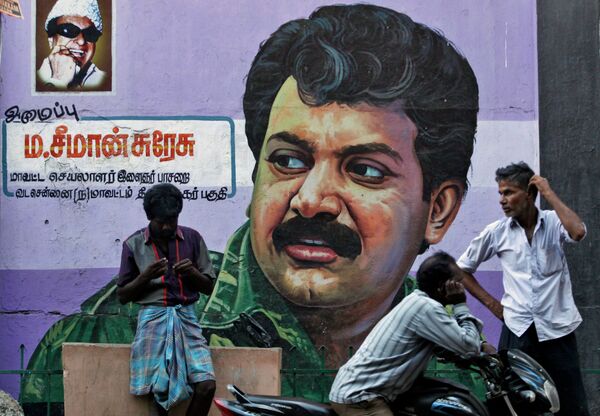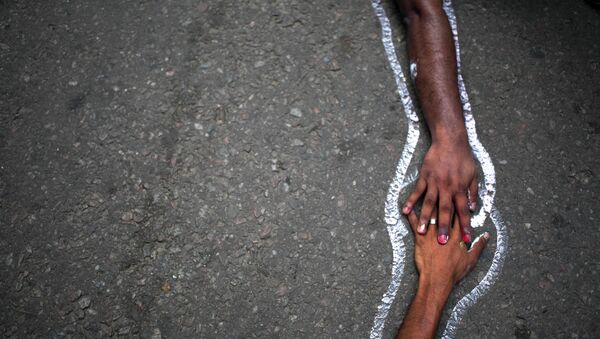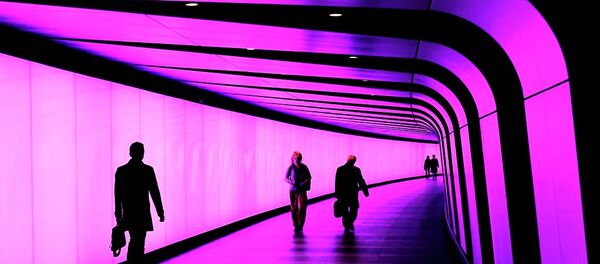Sri Lanka gained independence from Britain in 1948 and power fell to the island's Sinhalese majority. The minority, Tamils, who lived in Tamil Eelam have faced discrimination ever since.

Violence ripped through the heart of Sri Lanka killing more than 70,000 civilians in a war which Tamils claim amounted to genocide. People were tortured and executed and villages shelled.
The war came to an end in 2009 but civilians were caught up in the conflict. Mainly Tamils were confined in refugee camps for months afterwards amid allegations that the Sri Lankan government had ordered the execution and torture of any captured or surrendered rebels.
A new report published in Britain has found evidence that torture continued long after the war ended, right up until 2013.
"I have my refugee status here in the UK now, so I know I am safe. The wounds on my body have healed but not the ones in my heart."
When she was 18-years-old, Anuja entered into an arranged marriage with a man who later left home to join the LTTE. At the time their son was just six-months old. He did not tell her where he had gone, she only found out when another LTTE member told her.
"Every moment of every day, I wonder what has happened to my husband and my son."
More than 1/3 of cases in #TaintedPeace were #tortured on return to #SriLanka: http://t.co/2RV4ioUexa pic.twitter.com/UxinAkW8pE
— Freedom from Torture (@FreefromTorture) August 13, 2015
The report titled 'Tainted Peace: Torture in Sri Lanka since May 2009' tells the story of 148 Sri Lankans living in the UK. It's published by NGO Freedom from Torture and is based on medico-legal reports of the survivors' physical and psychological wounds.
#UK asylum policy for #SriLanka is out of line — see who is at risk: http://t.co/2RV4ioUexa #TaintedPeace pic.twitter.com/3LkC2Y7jx8
— Freedom from Torture (@FreefromTorture) August 14, 2015
A third of all torture cases in the study involved people who had returned to Sri Lanka having been sent back by Britain at the end of the war. The victims, living in the UK have come forward ahead of the country's elections.
"Since I left Sri Lanka a new President has come into power. Many people are saying that this means that the situation in the country will change, that we might experience true peace. But I think the problem runs deeper than that. Governments will come and go but the policies will not change."
According to the 'Tainted Peace' report, "research demonstrated that torture did not end when the fighting stopped. Rather torture — including rape and other forms of sexual torture and extensive burning — remains integral to the machinery of repression in Sri Lanka and continues to be perpetrated with impunity.
Watch @Drjulietrcohen and our other experts talk about new #TaintedPeace report on #SriLanka — http://t.co/2RV4ioUexa pic.twitter.com/gLQJJvN6Mw
— Freedom from Torture (@FreefromTorture) August 14, 2015
"All 148 cases of torture presented in the report were perpetrated after the end of the civil war in 2009, revealing "a disturbing picture of a tainted 'peace' in Sri Lanka.
A huge concern to Freedom from Torture remains that more than a third of the people who came forward to tell their story had been tortured in Sri Lanka — after returning or being sent back from the UK.
"Most had been in the UK as students but three had claimed asylum and were forcibly removed after their asylum claims were rejected.
"The majority were specifically interrogated about their reasons for being in the UK, their activities and/or their contacts in the UK."
From SSO's foreword in @FreefromTorture's new report on peacetime torture in #SriLanka: #TaintedPeace – pic.twitter.com/nP6oX8hHHu
— Survivors Speak OUT (@SSOonline) August 13, 2015
The methods of torture include beatings, burnings, sexual torture, rape, asphyxiation, stabbings and electric shocks, solitary confinement, blindfolded and mock executions.
"They were waiting for me at passport control," John, who studied in the UK, boarded a Sri Lankan Airways flight bound for Colombo in 2010.
"I was held at the airport for five hours, they asked me again and again ‘What were you doing in London against the Sri Lankan government?' When then President Rajapksa visted London in 2012, I took part in a demonstration against him. There were hundreds of us there, I have no idea how they identified me."
John then describes how he was tortured by the Sri Lankan authorities.
"My head was held underwater until I was suffocating and choking. They also put petrol in plastic bags and held them over my head till I passed out."
One of the many recommendations made in the report is that the UK ensures that people are not forcibly returned from the UK to a risk of torture in Sri Lanka, by updating its asylum policy for Sri Lanka to reflect on the evidence in the report — especially torture in 'peacetime' Sri Lanka.
Sri Lanka is the seventh highest country in a list of ten for people seeking asylum in Britain, according to Home Office data.
The UK's Foreign Offices cites Sri Lanka as a "country of concern" for its human rights record and advises visitors that "electoral periods in Sri Lanka have occasionally turned violent" and advises tourists to "avoid any political gathering or rally".
Sri Lankans are set to cast their vote in the country's general election on 17 August. Former President Mahinda Rajapaksa, who served between 2005 until January 2015 is running for parliament.
UK group: Sri Lanka still torturing #Tamil detainees, incl failed asylum seekers rtn'd from UK http://t.co/BkBJTNEGYv pic.twitter.com/GtWCeP0pCC
— Gerry Simpson (@GerrySimpsonHRW) August 13, 2015
In 2011, a UN report said both sides in the conflict had committed war crimes against civilians. The government denies its troops killed any civilians. In 2014, President Rajapaksa said a UN team leading a mandated international investigation into allegations of war crimes will not be allowed to enter Sri Lanka.





